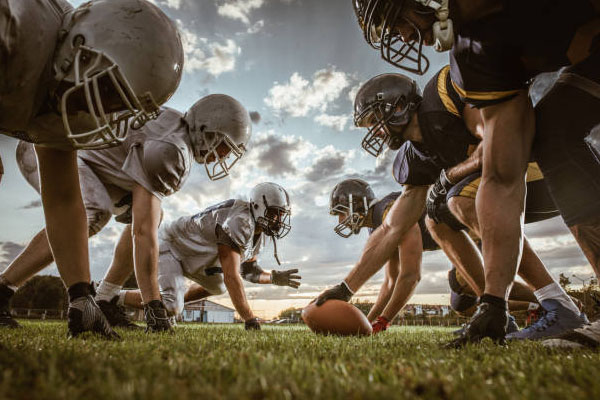Discover the incredible benefits of sports psychology for athletes From enhancing mental resilience to boosting performance, learn how this field can transform your game
Sports psychology is a field that offers athletes invaluable tools and strategies to enhance their performance and well-being. It delves into the mental aspects of sports, addressing issues such as performance anxiety, resilience in the face of setbacks, and goal setting. In this article, we will explore the many ways in which sports psychology benefits athletes, from improving their mental toughness and concentration to building effective team dynamics. Whether you are a professional athlete or simply passionate about your favorite sport, understanding the advantages of sports psychology can take your performance to the next level. Let's delve into the world of sports psychology and discover how it can help athletes achieve their full potential.

Understanding the Significance of Sports Psychology
The Role of Sports Psychology in Athlete Performance
Sports psychology plays a pivotal role in enhancing athlete performance in various ways:
- Enhanced Mental Toughness: It helps athletes develop the mental resilience needed to overcome challenges and setbacks, contributing to improved performance.
- Confidence Building: Sports psychologists work with athletes to boost self-confidence, which is essential for success in any sport.
- Goal Setting: Setting and achieving specific, measurable, attainable, relevant, and time-bound (SMART) goals is a fundamental aspect of sports psychology that keeps athletes focused and motivated.
- Stress Management: It equips athletes with tools to manage stress and anxiety, ensuring they can perform at their best under pressure.
The role of sports psychology is to help athletes harness their mental capabilities to reach their full potential and achieve peak performance.
How Mental Aspects Influence Sports Outcomes
The mental aspects of sports have a profound impact on the outcomes of competitions:
- Concentration and Focus: Athletes who can maintain laser-sharp focus are more likely to make accurate decisions and execute strategies effectively.
- Motivation: Athletes with high motivation levels are better equipped to push through fatigue and setbacks to reach their goals.
- Emotional Control: Managing emotions like anger, frustration, and fear is vital to prevent them from hindering performance during sports events.
- Visualization: The ability to use mental imagery and visualization techniques can improve motor skills and enhance performance in sports.
The mental aspects of sports directly influence an athlete's ability to perform under various conditions, making sports psychology an invaluable resource for those seeking to excel in their chosen discipline.
Enhancing Mental Resilience
Techniques to Build Mental Toughness
Building mental toughness is essential for athletes, and it can be achieved through various techniques:
- Positive Self-Talk: Encouraging and optimistic self-talk can boost self-confidence and help athletes overcome self-doubt.
- Visualization: Visualization techniques enable athletes to mentally rehearse success and prepare for challenging situations.
- Goal Setting: Setting clear, achievable goals and tracking progress can enhance motivation and mental toughness.
- Embracing Failure: Viewing failures as opportunities for growth helps athletes develop resilience and bounce back stronger.
These techniques empower athletes to endure adversity and emerge mentally stronger.
Coping with Pressure and Stress in Sports
Pressure and stress are common in sports, but athletes can employ effective strategies to cope with them:
- Relaxation Techniques: Practices like deep breathing and progressive muscle relaxation can alleviate physical tension and reduce stress levels.
- Mindfulness Meditation: Mindfulness techniques enhance focus and help athletes stay in the present moment, reducing anxiety.
- Mental Imagery: Imagining success and positive outcomes can alleviate the stress associated with competition and challenges.
- Support Systems: Building a network of support through coaches, teammates, and sports psychologists provides emotional support during stressful times.
Learning to cope with pressure and stress is crucial for athletes to perform at their best and maintain mental resilience in competitive sports environments.
Improving Concentration and Focus
Strategies to Boost Athlete Concentration
Enhancing concentration is a vital aspect of sports psychology, and athletes can employ strategies to achieve it:
- Mindfulness Training: Learning to be present in the moment and focus on the task at hand can improve concentration and reduce distractions.
- Attention Control: Training to control attention and shift focus as needed, ensuring athletes maintain concentration during sports activities.
- Pre-Performance Routines: Establishing rituals and routines before competition can help athletes maintain focus and eliminate pre-game distractions.
- Goal-Oriented Thinking: Concentrating on specific goals and objectives helps athletes stay engaged and committed to the task.
These strategies can help athletes hone their concentration skills and perform at their best.
Staying in the Zone: How to Maintain Focus During Competition
The "zone" refers to a state of optimal focus and performance, and athletes can learn to maintain it with specific techniques:
- Positive Self-Talk: Using affirmations and positive self-talk during competition can help athletes stay confident and focused.
- Visualization: Imagining successful execution of skills and plays helps maintain focus and commitment to the game plan.
- Routine and Rituals: Consistent pre-game routines and rituals can serve as triggers to enter the zone and maintain concentration throughout the competition.
- Controlling Emotional Reactions: Learning to manage emotions, such as anxiety and frustration, is vital for staying in the zone during high-pressure situations.
Athletes can master the art of staying in the zone by practicing these techniques and developing the ability to sustain focus during critical moments in their sport.
Managing Performance Anxiety
Recognizing and Addressing Performance Anxiety
Performance anxiety is a common challenge for athletes, and recognizing and addressing it is crucial:
- Identifying Symptoms: Understanding the physical and mental symptoms of performance anxiety, such as racing heart, self-doubt, and nervousness.
- Self-Assessment: Athletes can assess their own levels of anxiety and recognize patterns in their triggers and reactions.
- Seeking Professional Help: Consulting a sports psychologist or counselor for expert guidance on dealing with performance anxiety.
- Goal Setting for Anxiety Management: Setting goals to reduce anxiety and improve focus during competition.
By recognizing and addressing performance anxiety, athletes can take the first steps towards managing it effectively.
Tips for Overcoming Pre-Game Nerves and Anxiety
Pre-game nerves and anxiety can be challenging, but athletes can employ tips to overcome them:
- Deep Breathing: Practicing deep breathing exercises before and during competition to calm the nervous system.
- Visualization and Positive Imagery: Imagining success and positive outcomes can alleviate pre-game jitters and instill confidence.
- Rituals and Routine: Establishing pre-game rituals and routines that provide a sense of control and familiarity, reducing anxiety.
- Self-Talk: Replacing negative thoughts with positive affirmations and constructive self-talk to build confidence.
These tips can help athletes conquer pre-game nerves and anxiety, allowing them to perform at their best during competition.
Goal Setting and Motivation
Setting and Achieving SMART Goals
Goal setting is a fundamental aspect of sports psychology, and athletes can set and achieve goals effectively using the SMART criteria:
- Specific Goals: Defining clear and specific objectives, such as improving shooting accuracy or increasing endurance.
- Measurable Goals: Establishing goals that can be quantified, making progress tracking more manageable.
- Attainable Goals: Ensuring that the goals set are realistic and achievable within the athlete's capabilities.
- Relevant Goals: Aligning goals with the athlete's long-term objectives and the sport's requirements.
- Time-Bound Goals: Assigning deadlines for achieving goals to create a sense of urgency and commitment.
Athletes who follow the SMART goal-setting approach are more likely to stay motivated and see significant improvements in their performance.
The Psychology of Motivation in Sports
Motivation is a driving force in sports, and understanding the psychology behind it can help athletes stay motivated:
- Intrinsic vs. Extrinsic Motivation: Exploring the difference between internal motivation (enjoyment of the sport) and external motivation (rewards or recognition).
- Goal Orientation: Determining whether athletes have a mastery or performance goal orientation, affecting their motivation and behavior.
- Self-Determination Theory: Understanding the importance of autonomy, competence, and relatedness in motivating athletes.
- Self-Efficacy: Believing in one's own capabilities plays a significant role in sustaining motivation and overcoming challenges.
By delving into the psychology of motivation, athletes can gain insights into what drives them and how to maintain a high level of motivation throughout their sports journey.
Effective Communication and Team Dynamics
The Role of Communication in Team Sports
Effective communication is a cornerstone of success in team sports, and athletes can benefit from understanding its role:
- Coordination and Strategy: Communication allows team members to coordinate plays and strategies, ensuring everyone is on the same page.
- Motivation and Encouragement: Positive communication fosters motivation and provides support during challenging moments in games.
- Conflict Resolution: Open communication can help resolve conflicts and prevent disagreements from disrupting team cohesion.
- Feedback and Improvement: Constructive feedback from teammates and coaches is vital for continuous improvement.
The effectiveness of communication in team sports can determine the team's success and cohesion.
Building Better Team Dynamics Through Sports Psychology
Sports psychology offers valuable insights into enhancing team dynamics and cooperation:
- Leadership and Roles: Understanding leadership styles and individual roles within the team to maximize efficiency and harmony.
- Trust and Cohesion: Building trust among team members through trust-building exercises and activities that promote team cohesion.
- Mental Toughness: Developing the mental resilience of team members to overcome adversity and maintain a positive team atmosphere.
- Effective Goal Setting: Setting team goals that align with individual objectives, ensuring everyone works together toward a common purpose.
Sports psychology provides athletes and teams with the tools they need to foster better team dynamics and work cohesively towards success in their sport.
Resilience in the Face of Setbacks
Strategies for Athletes to Bounce Back from Failures
Resilience is the ability to recover and thrive in the face of adversity and setbacks. Athletes can employ strategies to build resilience:
- Positive Self-Talk: Encouraging self-talk that helps athletes view failures as opportunities for growth and improvement.
- Embracing a Growth Mindset: Cultivating a growth mindset that fosters a belief in continuous learning and development.
- Mentorship and Support: Seeking guidance and support from coaches, mentors, or sports psychologists to navigate setbacks.
- Goal Revision: Reevaluating and adjusting goals to adapt to changing circumstances and setbacks, ensuring they remain achievable.
These strategies empower athletes to bounce back from failures with resilience, determination, and a positive outlook.
Turning Adversity into a Learning Opportunity
Athletes can transform adversity and setbacks into valuable learning experiences:
- Post-Game Analysis: Analyzing performances, identifying areas for improvement, and implementing changes based on insights gained from setbacks.
- Mental Toughness Training: Engaging in mental toughness exercises that prepare athletes to cope with adversity and remain focused on their long-term objectives.
- Overcoming Fear of Failure: Addressing the fear of failure by viewing setbacks as stepping stones towards success rather than insurmountable obstacles.
- Resilience Building Workshops: Participating in workshops and programs designed to enhance resilience skills and mindset.
By embracing adversity as a learning opportunity, athletes can emerge stronger and more prepared for future challenges.
FAQ: The Benefits of Sports Psychology
Q1: What is the primary role of sports psychology for athletes?
A1: Sports psychology plays a crucial role in helping athletes enhance their mental resilience, focus, and overall mental well-being. It equips them with the tools to overcome mental barriers, manage anxiety, and perform at their peak in their respective sports.
Q2: How can sports psychology help athletes deal with performance anxiety?
A2: Sports psychology offers athletes strategies to recognize, address, and manage performance anxiety. These strategies include relaxation techniques, mindfulness training, and visualization exercises, enabling athletes to stay composed and perform optimally under pressure.
Q3: What techniques can athletes use to improve their mental toughness?
A3: Athletes can build mental toughness through positive self-talk, visualization, goal setting, and embracing failure as a learning opportunity. These techniques help them develop the resilience needed to bounce back from setbacks and maintain confidence in their abilities.
Q4: How does setting SMART goals contribute to athlete success?
A4: Setting SMART (Specific, Measurable, Attainable, Relevant, Time-Bound) goals allows athletes to focus their efforts, track progress, and stay motivated. It provides a clear roadmap to success, helping them achieve their desired outcomes in sports.
Q5: Can sports psychology enhance team dynamics in team sports?
A5: Yes, sports psychology plays a vital role in improving team dynamics. It helps athletes understand the significance of effective communication, leadership, trust, and mental resilience within the team. By fostering these qualities, sports psychology contributes to better team cohesion and performance.








